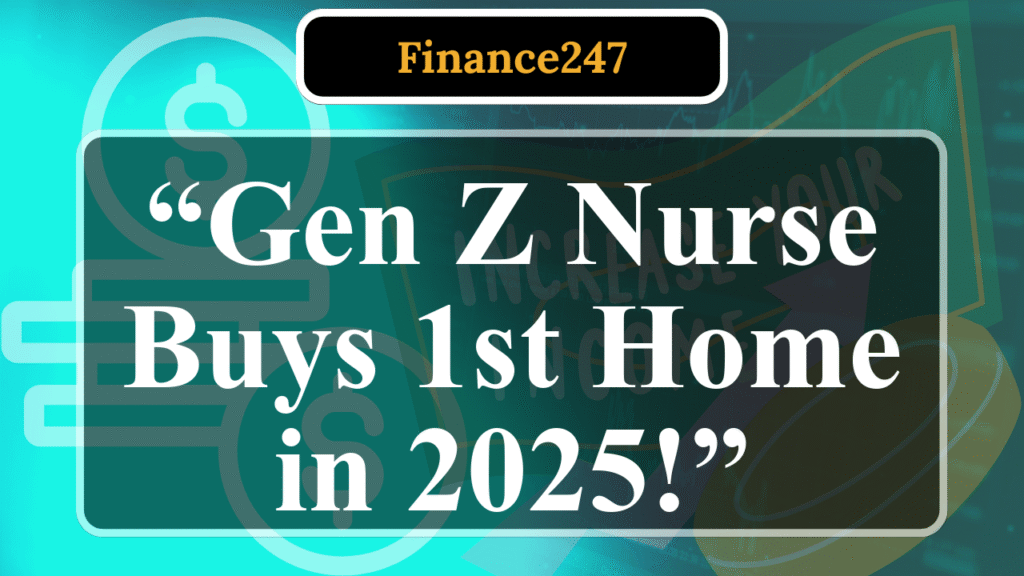A Gen Z nurse’s journey to homeownership in 2025 showcases strategic financial planning, leveraging low-down-payment loans, and family support. Facing high home prices and interest rates, they utilized FHA loans, side gigs, and co-buying to secure a $350,000 home. Financial literacy, budgeting apps, and sacrifices like skipping luxury purchases were key to overcoming market challenges.
A Gen Z Nurse’s Path to Owning a Home in 2025
In 2025, the U.S. housing market remains a formidable challenge for young adults, with median home prices hovering around $422,000 and mortgage rates near 7%. Yet, a 24-year-old Gen Z nurse, Mia, managed to purchase her first home in Denver for $350,000. Her story illustrates how determination, financial savvy, and creative strategies can help young professionals break into homeownership despite economic hurdles.
Mia, a registered nurse earning approximately $75,000 annually, faced the same barriers as many Gen Zers: high home prices, rising interest rates, and limited savings. According to a 2025 Redfin report, 21% of Gen Z prospective buyers rely on family loans for down payments, and Mia was no exception. Her parents provided a $10,000 gift toward her $12,250 down payment, which she supplemented with $2,250 saved from her income. This allowed her to qualify for an FHA loan, requiring just 3.5% down, far lower than the 20% often needed for conventional loans.
FHA loans have become a lifeline for first-time buyers like Mia. These loans, backed by the Federal Housing Administration, accept credit scores as low as 580 and offer competitive interest rates, making homeownership accessible for those with modest savings. In 2025, the Consumer Financial Protection Bureau notes that FHA loans account for 25% of mortgages issued to Gen Z buyers. Mia’s credit score of 620, built through careful use of a single credit card, was just enough to qualify, though she admits her limited credit history was a hurdle.
To boost her savings, Mia embraced the gig economy, a common strategy among Gen Z. A 2025 Bank of America report indicates that 75% of Gen Zers pursue side hustles to supplement income. Mia worked part-time as a freelance health content writer, earning an extra $500 monthly, which she funneled into her savings. She also used budgeting apps like Acorns, which 64% of 18- to 35-year-olds adopted in recent years, per company data. These tools helped her track expenses and allocate funds toward her home-buying goal.
Living with her parents for two years post-college was another critical move. A 2023 Harris Poll cited in USA Today shows 45% of 18- to 29-year-olds live with family to cut costs. By avoiding rent, Mia saved $1,200 monthly, amassing $28,800 over two years. This disciplined approach allowed her to cover closing costs and build an emergency fund, which experts recommend maintaining at 3–6 months of expenses.
Mia also explored co-buying, a trend gaining traction among Gen Z. A 2025 National MI report reveals that 33% of Gen Z adults are open to pooling funds with friends or family to buy a home. While Mia ultimately purchased alone, she considered co-buying with her brother, who could have contributed to the mortgage. This strategy, seen in 22% of Gen Z homeowners per a Bank of America survey, splits costs and makes larger homes more affordable.
Financial literacy played a pivotal role in Mia’s success. Unlike many peers—only 38% of Gen Z score correctly on financial literacy tests, per the 2025 TIAA Institute-GFLEC report—Mia educated herself through #MoneyTok on TikTok and Reddit’s r/personalfinance, which boasts 2 million users. She learned about mortgage options, interest rates, and tax deductions, ensuring she understood the long-term costs of her $350,000 home. Her 30-year FHA mortgage at 6.5% results in monthly payments of approximately $2,200, including taxes and insurance, which she budgets carefully against her $4,500 monthly take-home pay.
Sacrifices were necessary. Mia skipped luxury purchases, vacations, and dining out, prioritizing her savings goal. A 2024 Pew Research study notes that 30% of Gen Z plan budgets meticulously, focusing on value over flash. Mia’s frugality extended to buying a used car and avoiding high-interest credit card debt, which averages $6,932 for millennials but is lower for Gen Z, with only 10% carrying balances, per Experian.
Location strategy also mattered. Mia chose Denver’s suburbs, where homes are more affordable than in city centers. A 2025 CNN report highlights that remote work flexibility allows Gen Z to move to suburbs, with 25-minute commutes becoming acceptable for cost savings. Denver’s median home price of $410,000 was within reach for Mia, unlike pricier markets like Los Angeles, where median condo prices hit $940,000.
Mia’s story isn’t without challenges. High interest rates increased her monthly payments, and she worries about future rate hikes. The 2025 Fortune report notes that 72% of Americans, and 81% of those under 50, are concerned about mortgage rates. Still, Mia’s proactive approach—leveraging low-down-payment loans, side gigs, family support, and financial education—made her dream a reality. Her journey underscores that while the housing market is tough, Gen Z nurses with discipline and resourcefulness can still achieve homeownership.
Disclaimer: This article is for informational purposes only and not financial advice. Consult a financial advisor before making decisions. Sources include Redfin, Bank of America, National MI, Consumer Financial Protection Bureau, TIAA Institute-GFLEC, Pew Research, and CNN.


